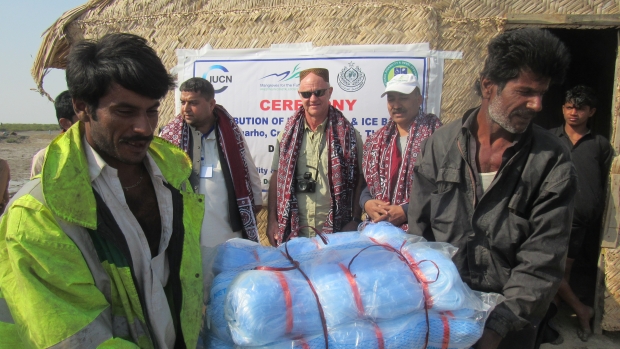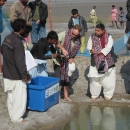Grants :: Small Grant Facilities :: Sustainable fishing practices promoted to reduce usage of harmful fishing nets in coastal areas of Sindh (Tippon Area).
Sustainable fishing practices promoted to reduce usage of harmful fishing nets in coastal areas of Sindh (Tippon Area).

Training on sustainable fishing practices to reduce usage of ... © MFF Pakistan
Objectives
Fisher folks in village Ali Hassan Dablo sensitized towards replacement of illegal nets and towards adapting legal fishing nets.
Background
The project is focused on fishermen who use harmful fishing nets which have resulted in depletion of fish stock and impacted livelihoods of dependent communities badly. The community survey has revealed that the fish catch has reduced to 86.6% and fishers strongly believe that stocks have depleted due to use of harmful fishing nets with very small mesh size. This is reflected in loss of income as reported by around 51.2% people due to fast declining fish catches. The fish caught with small meshed nets is being sold as fish meal for poultry and in this way the fish stock rejuvenating process is being altered by these illegal practices. Due to low catches and incomes fishermen communities are suffering from poverty, malnutrition, social evils and health issues.
Thus, project is aimed to address the root cause of problem and by focusing on the households involved in such harmful practices. Fishermen involved in such practices are indebted heavily and by promoting use of legal nets and supporting natural systems fishermen’s overall economic conditions will improve. The project aims to support 30 households in replacement of harmful fishing nets and to switch over to sustainable fishing practices. The project will encourage poor fisher folks to abandon banned nets and adopt legal practices to support healthy ecosystems.
The project would undertake social mobilization, group discussions with target groups and exposure visits to sensitize fisher folks toward adoption of sustainable fishing practices. A series of community meetings helped to identify and target a specific group of fishermen who have volunteered to replace their harmful ESBN nets (Bulo and Gujjo) with provision of alternative nets which are not harmful.
Target beneficiaries
The direct project beneficiaries include 30 fishermen families of village Tippon, Keti Bandar, stakeholders trained in Eco-DRR, university students engaged in community research. The indirect beneficiaries include local communities dependent on artisanal fisheries through increased awareness on negative impacts of illegal nets and dissemination of outreach materials.
Outputs
- Fishermen in village Ali Hassan Dablo (Tippun) mobilized towards adoption of sustainable fishing practices
- Alternate Livelihood options provided to 30 fishermen volunteering to abandon use of illegal fishing nets
- Community sensitized towards sustainable fishing practices and their capacity built in alternate livelihood options
- Knowledge/Lessons on current and previous initiatives related to fishing practices documented and disseminated
Accomplishments and challenges
Achievements:
- Fishermen in village Ali Hassan Dablo (Tippun) mobilized towards adoption of sustainable fishing practices through community meetings held for project orientation and identification of fishermen volunteering for abandonment of illegal nets and identification of alternate livelihood options.
- Community sensitized towards sustainable fishing practices and their capacity built in alternate livelihood options
- 10 fisherfolks groups (30 fishermen) provided with legal nets by replacing their illegal nets which were burnt in the presence of fisheries officials.
- Insulated fish cold storage boxes provided to 10 fisherfolk groups to reduce the post-harvest losses to improve the income of fishermen group.
- 10 fisherfolk groups provided with 10 mud crab fattening ponds to supplement their income loss. In these ponds, 1000 immature crabs have been stocked.
- Coordination meetings held with officials of Sindh Fisheries Department to seek their support, and developed and signed terms of partnership.
- Two training sessions on pond management organised with support from Fisheries Department.
- Awareness signboards designed for installation at the community level.
- Two university students supported for conducting community research.
- Community exposure visit of adjacent villages organised.
- A media exposure visit organised for the local media.
- 5 awareness sessions organised on legal and illegal nets in local schools.
- 500 Mangrove Saplings planted by community.
- Selected members of community trained on Eco-DRR for increasing community resilience.
- Project success stories documented and disseminated.
Contributions to cross-cutting themes
Gender: Equal opportunity to women of the areas will be provided to those women belonging to the fisher families who have been engaged by the project.
Use of Technology: NDF from the beginning of the intervention will keep in close coordination with the community through mobile phones. All the relevant information like floods, droughts, tsunami, price of fish and type, any government orders about fishing, etc. will be disseminated through SMS. The list of all the community persons having mobile phone will be shared with district / provincial disaster management authority (DDMA / PDMA) for timely information and early warning
Lessons Learned
- Small fishermen are supportive of abandoning use of harmful fishing nets and recommend strict action by fisheries officials.
- Coordination between fisher folk & Fisheries department developed to discourage harmful nets from the area.
Project Facts
Country
Location
Keti Bander Town, District Thatta
Topic
Duration
15th Apr 2016 to 14th Dec 2016
MFF Grant Amount
PKR 2,140,000
Co-financing Partner
National Disability & Development Forum (NDF)
Implementing Partner
National Disability & Development Forum (NDF)
Mr.Abid Hussain Lashari
President, NDF
National Disability & Development Forum (NDF)
Pakistan (Nawabshah Disability Forum)
Address: House No. 11 Bhangwar Colony VIP road, Nawabshah District Shaheed BenazirAbad, Sindh, Pakistan
Tel: 0244-366107, 0300-3211876
E-mail: abidlashari@ndfpakistan.com
